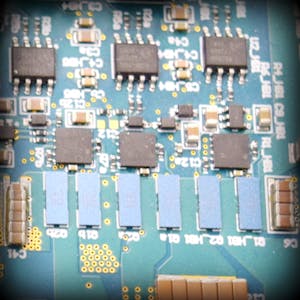Averaged-Switch Modeling and Simulation
This course can also be taken for academic credit as ECEA 5705, part of CU Boulder’s Master of Science in Electrical Engineering degree.This is Course #1 in the Modeling and Control of Power Electronics course sequence. The course is focused on practical design-oriented modeling and control of pulse-width modulated switched mode power converters using analytical and simulation tools in time and frequency domains. A design-oriented analysis technique known as the Middlebrook’s feedback theorem is introduced and applied to analysis and design of voltage regulators and other feedback circuits. Furthermore, it is shown how circuit averaging and averaged-switch modeling techniques lead to converter averaged models suitable for hand analysis, computer-aided analysis, and simulations of converters. After completion of this course, the student will be able to practice design of high-performance control loops around switched-mode power converters using analytical and simulation techniques.
We strongly recommend students complete the CU Boulder Power Electronics specialization before enrolling in this course (course numbers provided for students in CU Boulder’s MS-EE program):
● Introduction to Power Electronics (ECEA 5700)
● Converter Circuits (ECEA 5701)
● Converter Control (ECEA 5702)
After completing this course, you will be able to:
● Explain operation and modeling of switched-mode power converters
● Model open-loop transfer functions and frequency responses
● Design closed-loop regulated switched-mode power converters
● Verify operation of switched-mode power converters by simulations
● Understand the Feedback Theorem principles
● Apply the Feedback Theorem to practical design examples
● Derive averaged switch models of and averaged circuit models of power converters
● Apply averaged-switch modeling techniques to analysis and design and simulations of power converters
Explain operation and modeling of switched-mode power converters
Model open-loop transfer functions and frequency responses
Design closed-loop regulated switched-mode power converters
Verify operation of switched-mode power converters by simulations
Syllabus
Syllabus - What you will learn from this course
Week 1
Modeling, Control and Simulation of Switched-Mode Power Converters
Week 2
Techniques of Design Oriented Analysis: Feedback Theorem
Week 3
Averaged Switch Modeling and Averaged Circuit Simulations
FAQ
When will I have access to the lectures and assignments?
Access to lectures and assignments depends on your type of enrollment. If you take a course in audit mode, you will be able to see most course materials for free. To access graded assignments and to earn a Certificate, you will need to purchase the Certificate experience, during or after your audit. If you don't see the audit option:
The course may not offer an audit option. You can try a Free Trial instead, or apply for Financial Aid.
The course may offer 'Full Course, No Certificate' instead. This option lets you see all course materials, submit required assessments, and get a final grade. This also means that you will not be able to purchase a Certificate experience.
What will I get if I subscribe to this Specialization?
When you enroll in the course, you get access to all of the courses in the Specialization, and you earn a certificate when you complete the work. Your electronic Certificate will be added to your Accomplishments page - from there, you can print your Certificate or add it to your LinkedIn profile. If you only want to read and view the course content, you can audit the course for free.
Is financial aid available?
Yes. In select learning programs, you can apply for financial aid or a scholarship if you can’t afford the enrollment fee. If fin aid or scholarship is available for your learning program selection, you’ll find a link to apply on the description page.
Reviews
The course serves as a good starting point for small signal ac modeling and simulation for converters operating in the CCM / DCM mode of operation.
The teaching staff are honestly useless, but the instructor Dr. Maxim was good
Great course for power electronic modelling and simulation.
The course was well explained and the exercises and HW were helpful for understanding
